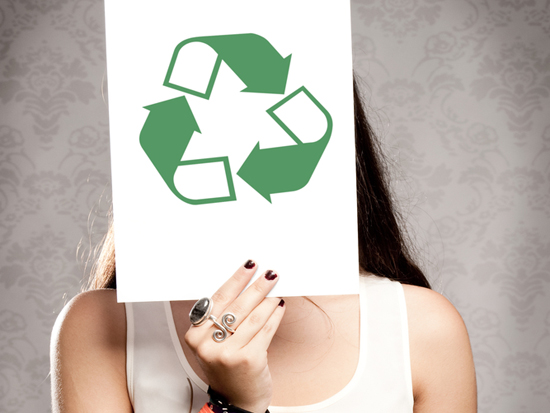千禧年可能不会像绿色的像你想象

Girl with recycling sign image by xavier gallego morell via Shutterstock.
你已经听到的老生常谈了多年:千禧更注重可持续发展。必威体育2018千禧优先购买绿色产品。千禧一代更关心环境。
The truth is, a lot of the "common knowledge" about this age group -- those born between 1980 and 2000 -- isn't accurate.We've been reporting for yearsin our Pulse studies that millennials are more attitudinally green than behaviorally green.
But we've softened this finding with mitigating explanations: "Most of them aren't homeowners yet -- so they don't have a need for a lot of green home improvement products." Or: "Their economic circumstances limit their ability to buy a lot of green products, since those products often cost more."
Maybe we've cut them too much slack. Here's the unvarnished truth about millennials from our2013 Eco Pulse study。
虽然他们在气候变化的坚定信仰者 - 66%的人认为它的发生,主要是由人类造成的,相对于整体的美国人58% - 其它的态度和行为不会同步与这种信念。例如,如果可以选择的时候,他们没有选择在自己的个人舒适和方便的环境 - 和18至24岁的孩子都特别舒适性为重点。他们也不认为自己是更亲自负责高于其他年龄组,以他们的日常生活习惯和购买行为改变以正面影响环境。
As noted, their average number of green habits and purchases falls far behind the average for Americans overall: 11.4 vs. 12.6. And yes, the biggest gaps are in the home improvement categories. However, millennials are slackers when it comes to a lot of everyday activities that cost nothing. Here's how they stack up to Americans overall:
• Always recycle aluminum cans, plastic bottles, newspapers and cardboard: 33 percent vs. 51 percent
•随身携带自己的包(S),当我去逛街:30%对38%
• Drink water from reusable containers instead of disposable plastic bottles: 40 percent vs. 43 percent
• Avoid letting the water run, such as when washing dishes or brushing teeth: 40 percent vs. 49 percent
• Always unplug things and turn off power strips: 28 percent vs. 33 percent
And while they are more likely to research issues and products on the Internet than other age groups, they are not more knowledgeable about many sustainability issues. For example, they are not particularly driven by health concerns or chemical avoidance and are not more knowledgeable about indoor air quality and VOCs or potential carcinogens in personal care products.
A fractured group
Additionally, millennials are not one big, sustainable, homogenous group. We see some big differences between younger millennials (ages 18 to 24) and older millennials (ages 25 to 33).
例如,虽然两个年龄组比所有其他人,25至33岁的店往往更关心的是节省资金,降低成本,而18岁至24岁的孩子更可能多说了,他们定期缴纳更多他们喜欢的品牌。
While both are significantly less dazzled by "Made in the USA" claims than older Americans, 18- to 24-year-olds are much more internationally focused, including being more worried about worldwide population growth and more committed to international environmental and health and human service initiatives.
Eighteen- to 24-year-olds are significantly more interested in 100 percent natural ingredients or 100 percent organic foods, while 25- to 33-year-olds are much less worried about GMOs.
Twenty-five- to 33-year-olds are much more impressed by product recyclability and recycled content, while 18- to 24-year-olds expect companies to offer take-back or trade-up programs.
The green millennial
A few things, though, do sync with the stereotype of the green millennial:
Buying and using green products is a more important part of the millennial public image than for all other age groups (40 percent vs. 33 percent overall). This indicates that sustainability is a cultural norm for them, and cultural norming is, perhaps, the most powerful force in affecting behavior long-term.
And while the numbers are small -- generally less than 20 percent -- more of them are tackling big, game-changing sustainable behaviors than Americans overall:
• Growing much of their own food (21 percent vs. 17 percent)
• Regularly making all-natural green cleaning products (16 percent vs. 13 percent)
•Bartering or swapping rather than buying(15 percent of 18- to 24-year-olds vs. 9 percent overall)
• Participating in a borrowing membership, such as Zipcar, rather than buying (9 percent vs. 5 percent)
•安装太阳能,地热或风力发电(8%相对于4%)
而更多的千禧说,他们很可能会参加在不久的将来(34%对25%)的替代品的所有权。总而言之,这代人有一个很长的路要走,以充分整合自己的信念和行动,他们仍然有很多东西需要学习有关可持续性。必威体育2018
However, what they're focused on is telling. They seem to be developing a more inclusive worldview and higher standards, and they're trying more disruptive behaviors. Smart marketers should take heed.
此列最初出现在Shelton Insights。要了解更多关于协作消费和可持续发展和技术的融合,一定要检查出必威体育2018VERGE SF Oct. 14-17。
Girl with recycling sign image by xavier gallego morell viaShutterstock。




